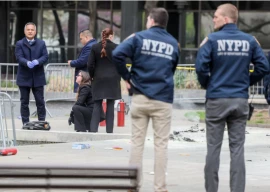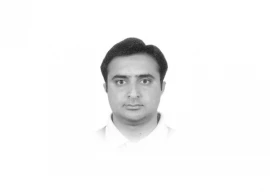
With constant stress, terrorist attacks, absence of social security and poverty, Pakistan is fast becoming a “psychological pressure cooker”, says co-chair of the Psychiatry in Developing Countries arm of the World Psychiatric Association Dr Afzal Javed.
According to Crescent Post, there is an epidemic of Post-Traumatic Stress Disorder (PTSD) in Pakistan due to anxiety induced by lack of basic necessities.
Dr Javed says:
Most people in Pakistan are living with a continued sense of helplessness, and rather than dealing with it they are accepting it. There is no concept of psychiatric social work in Pakistan. When your physical well-being is not guaranteed and you don’t have enough to feed your children your mental health is not a priority.
Psychiatrists in Pakistan believe that majority of the population is suffering from PTSD and that there is not much being done to help them.
The World Health Organisation estimates there are only 320 psychiatrists in Pakistan to deal with 176 million patients.
The article also points out the role of madrassas and their mushroom growth across the Grand Trunk Road that offers “free food, education and eternal salvation” as the Crescent Post puts it, contributing to the damage.
Dr Javed also believes that being a patriarchal society, it is rare that men in Pakistan admit their depression because it will indirectly mean that they failed to cope up with their responsibilities.
A report compiled by Consultant Psychiatrist Farooq Naeem for the International Journal of Mental Health Systems reveals that the ‘talking cure’ – a part of the psychological consultation – is often misunderstood because the doctors are mostly trained in English.
Hence, he thinks, that Cognitive Behavioural Therapy – used to help people overcome PTSD – needs to be adjusted according to Pakistan’s culture and language.
He says:
People have become very rigid, inflexible in their thinking, and confused about religion. Things are going badly wrong. Even now with the death of [Osama] bin Laden there is a blame-game going on and no one is willing to take the responsibility. People are unable to rationally analyse the situation and are becoming angrier. These are the classic symptoms of Post-Traumatic Stress. You find that Pakistanis have major issues around trust because they live in heightened security. After all, you never know who is living next door, your neighbours could be a suicide bomber.
Dr Javed says that the general practitioners and medical professionals need to deal with the situation before things get worse.
COMMENTS (30)
Comments are moderated and generally will be posted if they are on-topic and not abusive.
For more information, please see our Comments FAQ



































































"The article also points out the role of madrassas and their mushroom growth across the Grand Trunk Road that offers “free food, education and eternal salvation” as the Crescent Post puts it, contributing to the damage."
Great article, but how are people who're trying to help CONTRIBUTING TO THE DAMAGE? I don't get it.
Can anyone furnish reference of the report in which The World Health Organisation estimates there are only 320 psychiatrists in Pakistan to deal with 176 million patients.
I am sure there is a mistake here,Its India which is becoming a psychological pressure cooker, Pakistan is becoming a superpoweer
@ Azharuddin: So you already came to a conclusion that I have Psychosis Disorder, and then you suggest me to go and see a psychiatrist? Are you not one?
You came up with that diagnosis without taking history from me, without doing my mental status exam. Wow. Talk about 25th century, not 21st century, medical doctor!
One thing is apparent to all of us, you might have Narcissistic Personality Disorder, and that is precisely where you are deriving your grandiosity from.
@Iqbal Basha: Religious sermons, army, nuclear weapons and (most definitely) Mullahs DON'T make a country and secure its people optimistic (actually, too much emphasis on the above mentioned and we find ourselves in this mess). Education and respect for others does, with this comes money. Unfortunately, we concentrate too much on religion and nothing on other important things. Religion is important yes but we still have to live in this world and please keep the Mullahs away.
Pakistani society cannot harbor in the traditional waters and does't have the courage to move into open seas. Eventually the individuals will have to seek their personal salvation
It's funny how they'll bring in everything from bin Laden to terrorists to all kinds of other things which probably don't hold an iota of significance for the average Pakistani, but no one dares to mention the real elephant in the room: Zardari and US-backed regime of criminals and feudal overlords.
lol, fake : in France the numbers of 'psychologically pressurized' peoples is alarming, and the whole nation is hooking on anti-depressors ... good business for the pharmaceutics firms, eh ? The point is : their definition of "PTSD" is so large that it can include me, you and my dysfunctional inanimate yellow - huh - car. That was the main critic in France, and I'm dead sure that it's the same for Pakistan, at the first whisper they describe you with some horrific three Latin words and propose you their 'special treatments'.
Europeans have seen two WW... did they give birth to maniacs ? Probably not. Or not a lot.
@Bisphot: You know what ? I agree. :* In fact I think there's a concept of mediation in Sufism inspired from Hindu practices.
Isn't PTSD supposed to be Post Traumatic Stress Disorder? POST TRAUMATIC? Life after the trauma? We Pakistanis are going through a constant trauma so we don't have PTSD. We have what is called SD (Stress Disorder). More likely stressed by disorder. Things here do not follow an order. It's all chaos.
BTW, the fact that we don't have many psychiatrists here in Pakistan is something many Pakistanis take pride in. My dad was at a Jumma sermon a couple of weeks ago and the mullah went on and on about how Pakistanis are better than goroas in this whole area because we have angels and god on our side for dealing with our problems whereas poor goras have to talks to shrinks. It was actually very interesting since the mullah had all the numbers crunched together and was talking statistically. What he failed to realize though was that he was living and breathing in year 2012 and that mental diseases (just like any other disease) need to be treated. And if anybody thinks that people in Pakistan are not stressed out then they are wrong on so many levels I can't list.
Although personally I think good shrinks are quite extinct even in the gora-lands. If this starts to fly in Pakistan as well - omg the amount of cons that just passed through my head in an instance. God bless us.
@MD: After reading all your comments God forbid I came to a conclusion that you are suffering from severe psychosis disorder. It is my kind request to immediately go and consult one good psychiatrist from 320 psychiatrists in Pakistan for your mental treatment. Hope you get well soon :)
We already knew this. Heck, we live in the pressure cooker.
Time to learn yoga, meditation and return to Vedic roots.
@MD:
And PAK compared to North Korea is quite rich. That is just a silly comparison at best...
The article fails to fit your perspective. I think a lot of readers saw this when you commented on how PAK is functional. You obvious have a very low standard of what functionality is.
@ ayesha: Moreover you said that most students end up becoming GPs. Did you know that it is the responsibility of a GP to diagnose and manage PTSD cases (excluding complex cases), especially when psychiatric services are not that easily available? A GP should be trained to treat PTSD. you dont need a psychiatrist to treat that. Any person with a medical license and awarded M.B.B.S degree in Pakistan should be able to treat basic PTSD cases.
Ayesha: You have assumed that orthopedic surgery and cardiac surgery are lucrative careers in comparison to psychiatry. What is your evidence for it? Do all orthopedic surgeons get jobs compared to psychiatrists? What do you include in the definition of "lucrative?"
As for Dr. Javed exaggerating, on which you showed skepticism by using "not," the onus is you or on Dr. Javed to prove that indeed MAJORITY of country, which means more than 50%, with conservative measures, of people are formally diagnosed with PTSD.
There clearly is a difference in non-functional and not so well-functioning. Yea compared to Afghanistan, Pakistan is quite well functioning. How do you define well functioning? It depends on definitions and criteria included in it. If your definition includes titty bars or Hooters on the corner of every street then sure Pakistan is non-functioning. If you define it as a place where people have more or less some opportunity to make money, then it seems it is functioning. Of course there is always room for improvement but the 180 million people yet have not committed collective Japanese style Kamikaze missions.
@haris javed, How youc an stay positive if you see such awful things which you hardly can imagine. Where you were when people of Swat young old were finding shelter in Peshawar and camps, if you would have listened there stories of Taliban Brutality, even an angel could not stay positive.
Beautiful Article, Thanks tribune to raise this issue. When ever i come across talking to Pakistani's in Pakistan i found them frustrated with numerous issues, and this misery does not end here. There problems seem ongoing, non stop, with no end in sight.
It is shocking enough to learn this that there is no social security in Pakistan. We rich or middle class who are aware and has access to medical care or outside Pakistan health facilities should be thankful, but think about those who are less privileged, low income how would they can and will help themselves to come out of these none stop cycle of miseries. We should make general population aware of mental health but also provide some sort of relief in daily lives by contributing, sharing and helping our country men and women who cant afford such care.
Dr Alay Ahmed a brilliant Psychiatrist in Peshawar University once highlighted that mental health is like oxygen of soul.
No wonder why people are so indifferent and ignorant about mental health, just ask any psychologist how much it affects the mental health of a child of 5 if you slap him or snub him , you will get your answer. may Allah help Pakistan.
two words: Be Positive =)
A god created country with largest army, nuclear weapons, lot of mullahs and everyday religious sermons fail to make its people (leave alone minorities) secure and optimistic. Infusion of hatred, religious fundamentalism combined with helplessness and uncertain future lead to this situation.
absolutely
Exactly....
This is very true. Unfortunate, that people do not recognize. One can only take so much stress before becoming psychotic or delusional. I am afraid, as a nation, we are way past that point.
Psychiatrists... They blow everything out of proportion. Our mobile phone generation may be suffering from PTSD and what not, but a great part of our elder generation is well off because of the psychological cushion of religion and social bond; both of which are disappearing from our society :(
I was sitting in the same position as shown in the pic before clicking on the link.... I don't know how long people will still support & vote PPP, PML(N),(Q), MQM, ANP etc Its time for the change...Its time for PTI...!!
@MD: "320 psychiatrists? There are only 320 medical students in one medical school in one small city, where are the other “intelligent” medical graduates moving to?
Majority of population suffers from PTSD? Dr. Javed is clearly exaggerating. If majority of society was suffering from PTSD, this country would be non-functional by now"
The 320 was the number of psychiatrists. This information is not inconsistent with the fact that there may be 320 medical students in one medical college in one small town. As to where all these Dr go? Many of them could be GP. Others could specialize in more lucrative areas such as orthopaedic surgery, heart surgery etc. Finally don't forget that a sizeable percentage also emigrates.
Secondly, Dr. Javed might be exaggerating (or not). But your argument seems to be that these numbers cannot be accurate or else Pakistan would be non-functional. Just curious - do you think it is a well functioning country?.
@MD,
The country is almost non-functional now, although I agree that Dr. Javed is exaggerating a tad bit.
It does not surprise us to know that citizens are suffering from stress related psychiatric problems. People have been told so many lies by parents, teachers, neighbors, Mullahs, Armed forces and the Government, it has become impossible to trust anyone. People are very confused because thieves and looters are prospering, this goes against the basic tenet of good conquers evil. Secondly, the clergy whose duty it is to provide spiritual solace are preaching hatred and violence. No individual or group wants to address the issues that have brought the nation to this state, it may upset too many holy cows. Life is cheap, law and order uncontrollable and crime is sky rocketing. Fear is palpable. Where is Houdini ?
We are moving from being an epicenter of terrorists to an epicenter of psychotics.
"Whom the gods would destroy, they first make mad."
Euripides Greek tragic dramatist (484 BC - 406 BC)
This might be the last warning to the people of Pakistan by Dr. Dr Afzal Javed, if not adhered to accordingly then God bless us all here in the land of pure.
"People have become very rigid, inflexible in their thinking, and confused about religion. Things are going badly wrong. Even now with the death of [Osama] bin Laden there is a blame-game going on and no one is willing to take the responsibility." . Worth repeating and definitely right on the money.